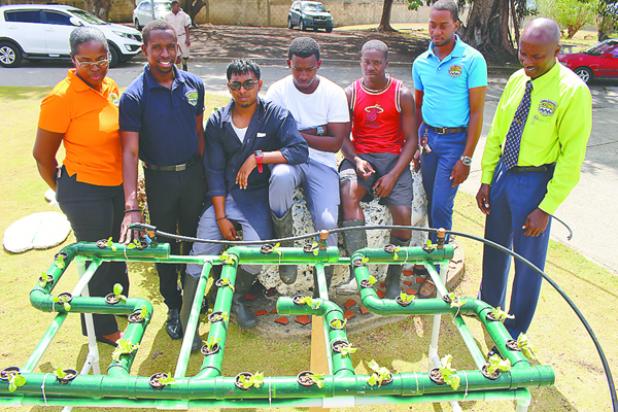
Principal of the St. George Secondary School, Dennis Browne (right), and Head of the Science Department Jillian Sealy (left) watch as Agricultural Science Teacher, Russell Smith-Ollivierre (second from left) gives details about the aquaponics system, in the presence of students Ravindra Chandan, Tyrell Gill and Kivere Clarke and Assistant Agricultural Science Teacher Omar Worrell (second from right), who also worked on the system.
Youth showing keen interest in non-traditional areas of agriculture
Youth at the St. George Secondary school are honing their skills in aquaponics, with the hopes of investing in this and other non-traditional areas of agriculture, to earn them a future living.
The Barbados Advocate recently visited the school to view a set-up of some of its winning exhibits, recently showcased at Barbados’ premier agricultural exhibition, Agrofest, and to engage both teachers and students about their agricultural activities.
Agricultural Science Teacher Russell Smith-Ollivierre indicated that a number of youth are showing a keen interest in non-traditional agricultural areas and view the setting up of aquaponics systems as a viable potential revenue stream that, once given the right inputs, can reap great dividends down the line.
In setting up the aquaponics systems, the students combine the use of aquaculture (raising fish) and hydroponics (the soil-less growing of plants) in one integrated system, to produce organic crops such as lettuce and cabbage and even some culinary herbs.
“We decided to build the system for Agrofest. We are very familiar with the system, because this is like our third or fourth aquaponics system. However, we wanted to place a different twist on it, so we decided to place the school’s initials into the setup” Smith-Ollivierre explained of the system, bearing the school’s initials SGS.
“The cost, inclusive of the pump would be around BDS $600 for a setup like this. It is very efficient because, with a system like this, you have less pests and you have very little to no weeds, since there is no soil. So those are some of the pros. The produce also grows really fast. So traditionally, lettuce in the field would be like six weeks, but in a system like this, we would shave off approximately a week, so you can get lettuce in a system like this in about five weeks or so,” he further noted.
Smith-Ollivierre stressed that it is this kind of agricultural pursuit, that is holding the interest of youth.
“We know that a lot of youth today are kind of squeamish in terms of the soil, so we know that this would fit well in a traditional household. One of the only drawbacks I would say would be the use of electricity, because the pump would obviously have to be turned on 24/7, but with the solar systems becoming more popular in Barbados, I don’t think it should be too much of a problem (to make the switch),” he stated.
He added, “I think that we need to step away from the traditional forms of agriculture and how we view it. I am not saying there is a problem with the soil, but we need to show different aspects of agriculture and I think with this technology, the young people will gravitate towards it and those are the ones that we would need to be more involved in agriculture. So I think a system like this would definitely be the catalyst of change for that.”
Students Ravindra Chandan, Tyrell Gill and Kivere Clarke who worked on the system, indicated their interest in reproducing what they have learnt, to help them earn a living at present and after leaving school.
